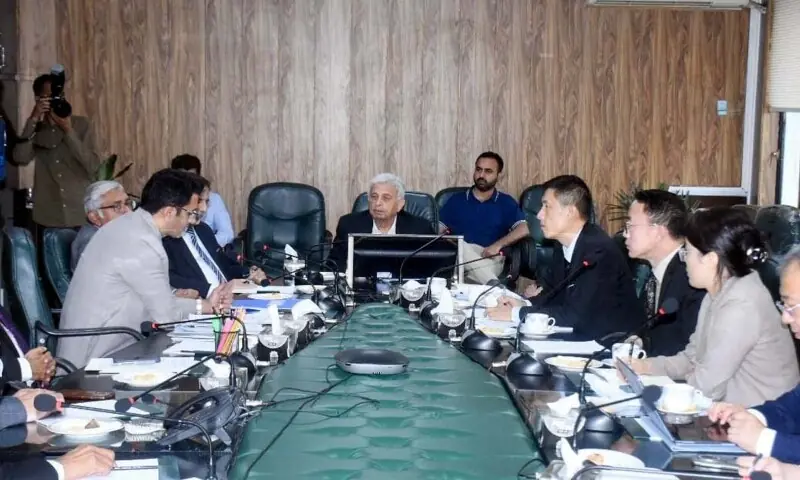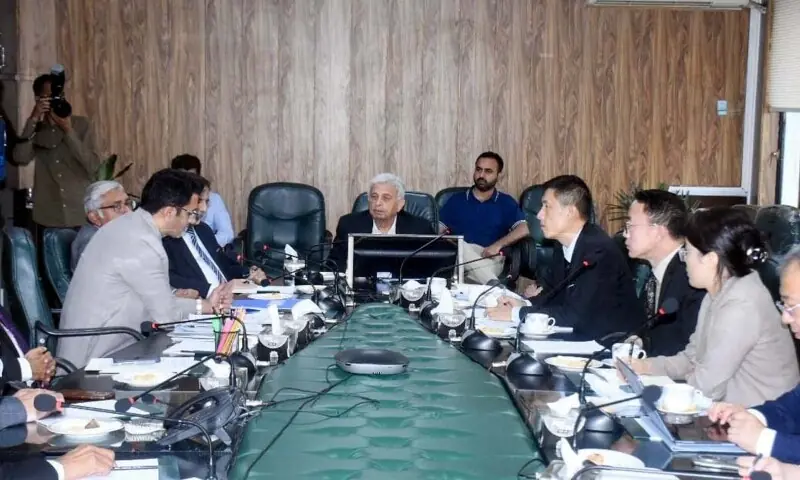Islamabad: The government is seeking assistance from the Chinese Academy of Agricultural Sciences (CAAS) to reorganize the Pakistan Agricultural Research Council (PARC) into a modern and dynamic agency that can address emerging agricultural challenges and ensure national food security.
National Minister of Food Security and Research Rana Tanveer Hussain held a detailed discussion on Monday, discussing the PARC’s transformation with the delegation of the Chinese Academy.
The Chinese team shared their experience of successfully changing CAA nearly two decades ago and provided valuable insights into the reform process of PARC.
They identified financial restrictions, limited incentives for scientists, and restrictions on international cooperation as key obstacles to PARC.
They stressed the need for competitive models and were supported by long-term investment and stronger collaboration with private sector and international partners.
Chinese team cited financial restrictions, limited international cooperation as a key obstacle to the council
Mr Hussein reiterated that reforming the PARC was a national priority and ensuring that the government fully supported the process and expressed confidence that through China’s partnership and Pakistan’s commitment, the PARC would become a powerful and modern research institution. Solutions to increase agricultural productivity and ensure the country’s food future.
The Chinese delegation was led by Ms. Yan, Advisor to the International Cooperation Bureau of the Ministry of Agriculture and Rural Affairs of China.
She was accompanied by Ms. Long Wanrong, Advisor to the Personnel Department of the Ministry of Agriculture and Rural Affairs. She has also served as a professor and director at the CAAS Vegetable and Flower Institute.
The delegation also included Senior Expert Professor Jia Yaxiong, Director of Science and Technology Management Department of the CAAS Institute of Animal Sciences.
In his speech by the Chinese delegation, Hussein emphasized that agricultural research must be directly aligned with the needs of farmers and industries to ensure that scientific innovation is transformed into practical solutions that contribute to food security and economic growth.
He stressed that PARC’s transformation roadmap must include a clear timetable, measurable outcomes and sustainable investment mechanisms. The Minister also stressed the importance of rewarding scientists for innovation and pointed out that talent retention requires incentive structures related to the commercialization of research.
The Minister welcomed the proposal for a mutual visit and exchange plan between PARC and CAAS, stressing that Pakistani scientists must benefit from the first research model of exposure to CAAS. He further noted that the sleeves that will now be signed between PARC and CAAS will now be put into operation to enable the joint efforts to form concrete.
The Chinese delegation also visited PARC and expressed strong support for future cooperation between CAAS and PARC during its meeting with agricultural experts.
The head of the Chinese delegation said: “We are committed to continuing to support Pakistan’s agricultural development. Strengthening this partnership is crucial to ensuring food and nutrition security in both countries.”
Amir Mohyuddin, Minister of Food Security and Research, highlighted the key role of innovation and international cooperation in shaping the future of Pakistan’s agriculture sector, while discussing the PAK-CHINA collaboration in the agricultural sector.
“We are facing challenges of climate change, water shortage, a decline in soil fertility and a rapidly growing population that is science-oriented and innovative solutions. International cooperation, especially with China, provides Pakistan with historical opportunities for modern agriculture and strict farming food security,” he said.
During the discussion, PARC Chairman Dr. Syed Hassan Andrabi said that despite limited resources, PARC continues to play a key role in promoting the national economy through research and innovation.
“We see the enormous potential of joint ventures with China to address reciprocity challenges, especially in climate change adaptation, food insecurity and sustainable production systems,” he said.
Dr Andrabi proposes to establish a center of excellence at the PARC-National Agricultural Research Center (NARC) of the CAAS model, focusing on high-impact food security research, climbing elastic technologies and sustainable agricultural development.
This visit marks a new chapter in China-Pakistan agricultural cooperation, where innovation, technology transfer and sustainable practices will form the basis for a common future.
The proposed NARC Centre of Excellence is expected to act as a flagship project under this collaboration, demonstrating the agricultural friendship between China and Pakistan as a model for the region.
Posted in Dawn on September 23, 2025



